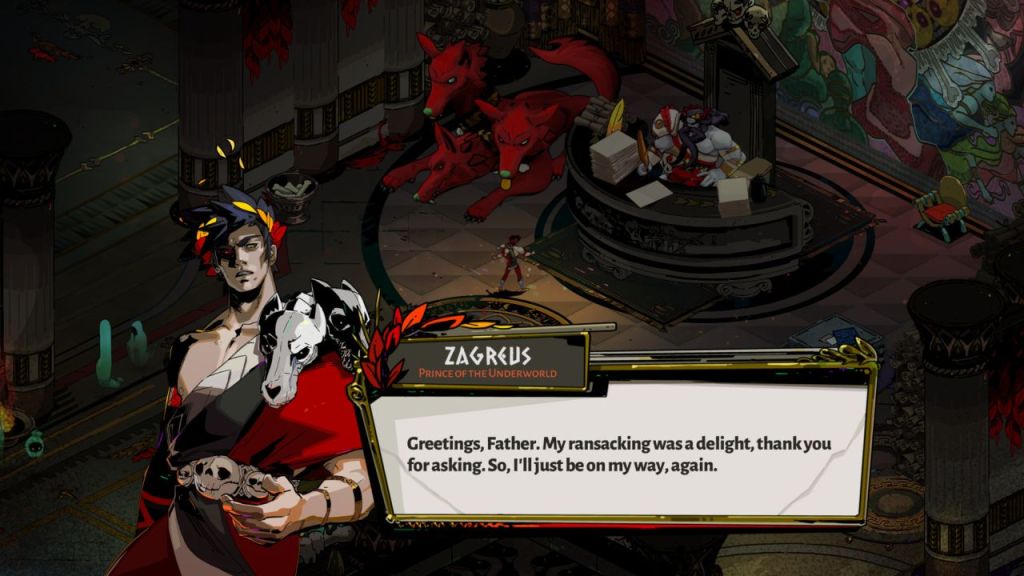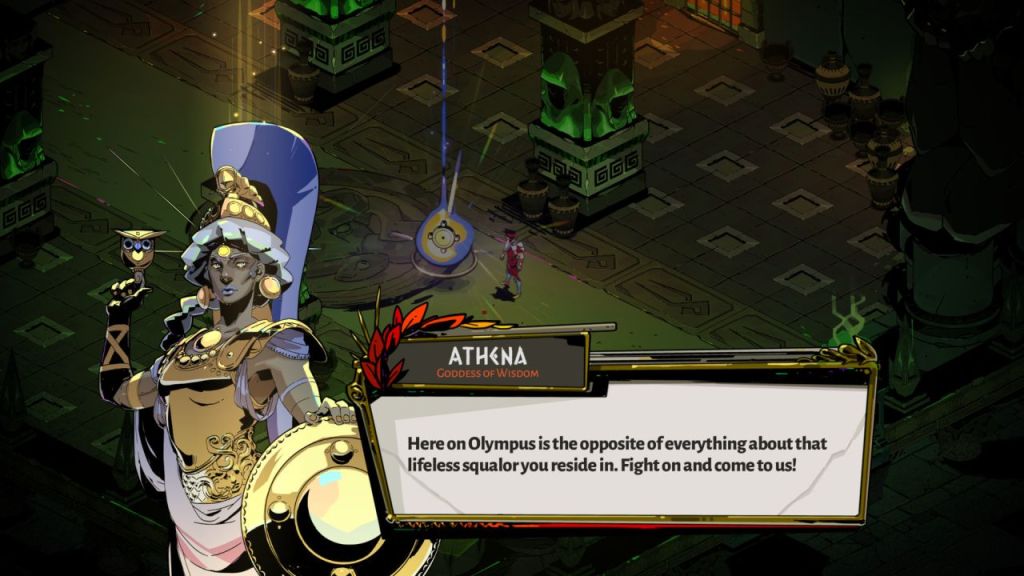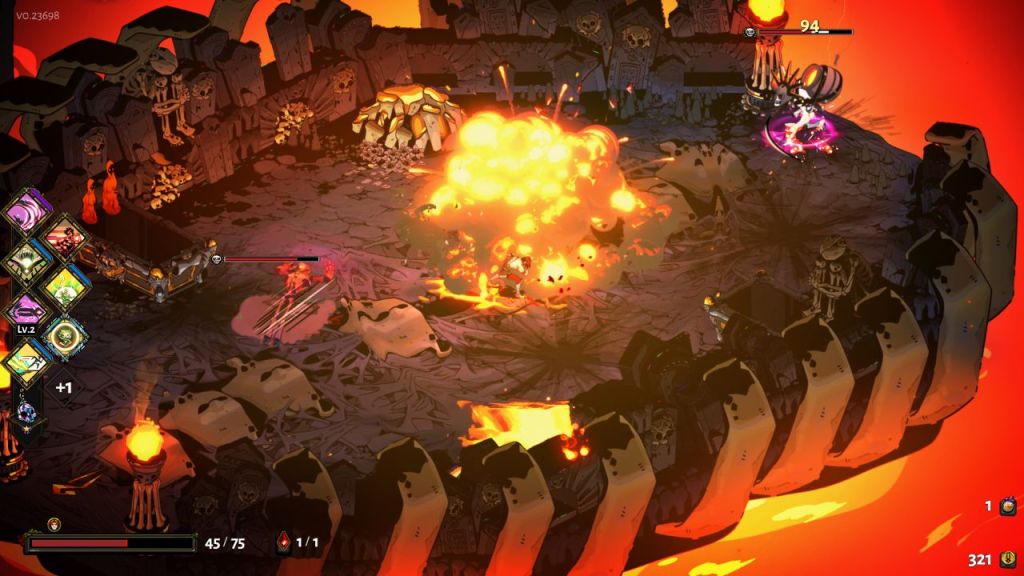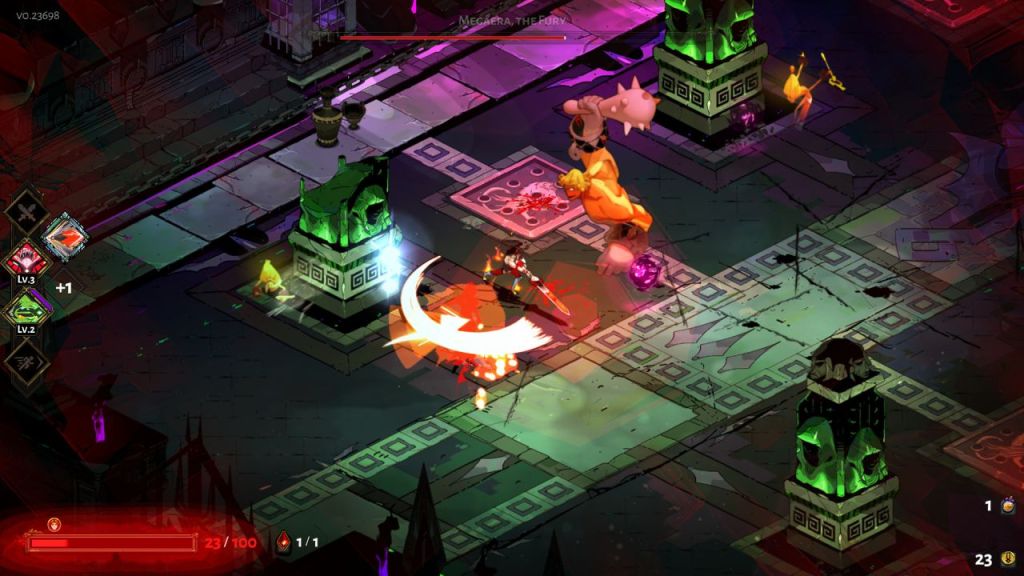(in my best Kratos voice) get rekt, boy.

It’s time for another “Prof. Smash explains why [insert genre here] isn’t for him” segment! Yes, in addition to RPGs, rogue-likes and their cousin rogue-lite is a genre that I traditionally don’t get deeply into. I can appreciate the ideas behind it and acknowledge that the moment to moment gameplay is often very enjoyable, but I also don’t particularly enjoy resetting my progress every time I die or complete a run like this is an arcade game from the 80s. There’s rarely a feeling of accomplishing something, and I like feeling like I’m doing something meaningful when playing games. So, what brought me to Hades then? After all, it’s no secret that it is also a rogue-like game with many of the trappings of the genre. However, I was also aware that Hades did some things to give a sense of progression between runs. Call it curiosity, I suppose. I sampled it one day from someone’s device, found it to be fun, and thought “heck, I’ll add it to the wishlist and maybe play the full thing one day.” And now, here we are.
This rogue-like actually has a narrative to it, another element setting Hades apart from others in its genre, so let’s start there. In Hades, you play as the son of the titular god of the dead, Zagreus, as he attempts to break out of the underworld and reach the surface for some unknown purpose. Aiding him are the various Greek deities like Zeus, Poseidon, and Athena, though their communications with Zagreus are completely one-sided as they cannot interact with each other directly. Now, unless you’re really good at the game from minute zero, shortly after starting the game you’re gonna die mid-run, at which point Zagreus emerges from the Pool of Styx and finds himself back in the House of Hades, where his father presides. Hades informs Zagreus that there is, in fact, no escaping the Underworld and that his son’s attempts at doing so are futile. But Zagreus isn’t really the type to take “no” for an answer, so he tries it again. In fact, he has sworn to keep trying over and over until he one day reaches the surface.

So, the fact that this rogue-like game has an ongoing, active narrative at all is already a point in the game’s favor. Most games like this don’t (at least from what I’ve played), instead relying on lore at most. And I like lore as much as the next guy, but there’s something to be said for there being actual characters, conversations, and plot beats in a rogue-like game. And the story ties pretty directly into your activities in the game. You, like Zagreus, are trying to get out, and you’re probably gonna fall a few times before you ever successfully complete a run, so you keep trying until you get that sweet, sweet taste of freedom. The gameplay and the story reinforce each other, which is always a welcome aspect of video game storytelling. All this said, your actual mileage on the game’s narrative is going to depend on how much you like the characters, because other than some occasional story flashbacks further explaining the actions of Zagreus, the plot doesn’t make any meaningful progression until you complete a run for the first time. After that, there starts to be a bit more of an ongoing story that reveals itself more and more with each successful run. To see credits roll will ultimately require you do ten successful runs, and I was neither underwhelmed nor overwhelmed by the ending. Just kinda whelmed. I was honestly hoping for some last surprise during the final run or two, whether it be some crazy new boss fight waiting for me or a dark revelation of some sort, but that didn’t happen. In fact, the main story just sorta ends, and I didn’t feel much of anything during this ending. Some of this can almost certainly be tied to the fact that it’s a rogue-like and the game needs to justify continued runs even after the credits roll. Thus, while it is appreciated that Hades does have some kind of narrative to go along with your escape attempts, the narrative feels a bit trapped by the gameplay genre.
Until the story starts to take off more, it’s mostly banter between Zagreus and his friends and foes. Between runs is where dialogue and character development tends to happen, with usually only the gods of Olympus chiming in during runs (and again, those conversations are pretty one-sided). And for a decent chunk of the game, this is perfectly fine. Hades and Zagreus taking shots at each other whenever Zagreus once again emerges from the Pool of Styx was consistently a highlight, and I always got a small smile at Hypnos mocking Zagreus for his failed attempts. I guess I like being told I suck, sometimes. There’s plenty of other good relationships to explore as well, such as the mentor and student relationship between Zagreus and Achilles or the small pieces of background information you gain from Nyx. Even mid-run the various gods you come across have fun, over the top personalities that are fun to listen to while also occasionally giving you even more lore to chew on. For the most part, the dialogue is entertaining and can even encourage you to keep trying your escapes, whether it be through someone’s encouragement or to simply spite daddy Hades.

I say “for the most part” though, because while most character interactions are enjoyable enough, the ones that aren’t really stand out. For instance, when I said I like the way Zagreus and Hades dig at each other between runs, I’m mostly talking about Hades’ quips. See, the voice acting in this game is a little hit or miss, and unfortunately the main character himself kinda embodies this. And given that the game has placed quite a bit of emphasis on its story, to the extent that I somehow managed to go the whole nearly thirty hours of playtime without hearing a repeated non-gameplay line (which is another point in its favor, I have to admit), the voice acting can sometimes take away from the story. Zagreus, for instance, is really good when he leans into his snarky personality and devil (Hades?) may care attitude, but there’s a lot of moments where he needs to be more earnest and just isn’t. He has a bad habit of not letting certain lines breath, instead opting to go through a lot of his dialogue as quickly as possible. That works in some places, not so much in others. And that’s just Zagreus. Meg is by far the most guilty of voicework that takes away from the story. I really don’t understand what the goal was with Meg’s voice direction, she’s so monotone and is doing this weird ASMR thing where she’s soft spoken even though it doesn’t really make sense for her to be. She’s not the only one with these qualities, in fact Zagreus is also a bit guilty of being monotone, and just about everyone in this game is soft spoken for some reason, but she is the most consistent and, in my opinion, grating. Even Hades, who definitely has some of the strongest voicework in the game, has his moments where he falters. And yes, I know it’s blasphemous to imply Logan Cunningham isn’t a supreme god of voice acting, and to be clear he largely does a good job especially when you add in all the other voices he’s contributing to the game. But at the same time there was the odd moment here or there that felt like a better take was waiting, such as an argument between Hades and Nyx that seems like it should be more heated and “loud”, but remains oddly quiet the entire time. It’s a bit of a shame because, when the voice acting is strong such as during the majority of Hades’ dialogue, the taunts from Asterius during the boss fight in Elysium, or Dusa’s amusing awkwardness, the story is genuinely enjoyable. But then you’ll have less than stellar voice acting bring the story back down. It’s a bit of a mixed bag in this regard.
Moving on to the gameplay, Hades has you attempting to escape the underworld with nothing but your wits and a weapon to aid you. Zagreus has a basic attack, special attack, a “cast”, and a dash to work with from the start of each run. As you progress through various rooms and encounters you can gain new abilities, mainly boons granted to Zagreus by the various gods of Olympus. You’ll use these boons and other items found along the way to modify your stats and abilities, such as dealing more damage or gaining an electric effect to your dash. In true rogue-like fashion, these encounters and the powers to be found are randomized to keep every run feeling as unique as possible. You won’t have the option for any do-overs while escaping the underworld, meaning if you die, you’re starting over from the beginning. While traveling through the underworld you’ll also collect permanent resources like darkness and gems that, should you fail, can be used to permanently upgrade Zagreus in some way, unlock new weapons, or update the underworld with new stuff to help you on your future escape attempts. The game has a lot of different resources and currencies, all for different purposes that you’ll discover over time.

Remember how I said trying the game out courtesy of someone else’s copy is what compelled me to look further into this game in the first place? That should be the giveaway you need to know that I find the basic moment to moment gameplay of Hades fun. It varies from weapon to weapon of course – I don’t find the bow and arrow nearly as riveting as the sword – but overall I think you can start a run with a weapon of choice and always meet some minimum level of enjoyment with just the base mechanics. I personally liked zipping around arenas and whacking enemies with my weapons endlessly until they die. Like any good action game, there’s a satisfaction in dodging at just the right moment and laying on your most damaging string when the opening presents itself. Bosses showcase this better than anything else in the game. It’s best to watch what they do and approach them as necessary, which means those moments where your strategy works out correctly end up feeling good thanks to your combination of smart dodges and heavy hits. And because of the inherently repetitive nature of gameplay, your knowledge of various weapon skills, enemy patterns, and boons feed into that feeling of growing smarter and more capable of conquering the underworld. Tack on the upgrades you find in the middle of a run and other random elements to keep you on your toes and you’ll likely find each run of Hades a fun and engaging experience.
I know it kinda goes against the usual design philosophies of rogue-likes, but I for one am very glad for the existence of permanent upgrades in Hades. More than any story beat or particularly good run, these are what compelled me to go at it over and over again. You’re given a mirror of darkness that you spend your darkness resource on to improve things like attack strength, number of dashes you can perform in a row, and even extra lives to be spent mid-run. These are the more substantial upgrades, but there’s also weapons to unlock alongside variants of said weapons, new rooms for the underworld, and equipment to find that grants some kind of perk. And a lot of these upgrades contain upgrades within themselves, like how equipment can get upgraded the more it’s used. This gets around my personal hangup of the genre, that feeling of never making any meaningful progress. If you’re reading this, it’s safe to say you’ve been in that delightful situation in other rogue-likes where your run isn’t going well and you just feel like you should give up. However, thanks to the permanent upgrades found in Hades, even a bad run can have purpose by using it to gather up resources for the next attempt. Feeling like you’re just gonna die at the Hydra no matter what you do? Fair enough, spend the rest of the run gathering what darkness you can and invest that into a max health upgrade for next time. At worst, you’ve made a little progress towards next time, and at best you surprise yourself and get further than you thought you would. You stay winning either way, even if that death screen says otherwise, and it makes even failure feel okay knowing you’ve got more power and knowledge for the next attempt. Of all the things in Hades, this is the element that kept me playing the most. Between this and the solid action loop, I got close to thirty hours of playtime from this game. Without either of these elements, I suspect that playtime would be a lot lower.

However, though these upgrade systems are greatly appreciated for someone like me who values the feeling of progress, I cannot deny that it’s also a bit of a double edged sword. What these upgrades ultimately aim to do is make you capable of reaching the final boss consistently, which is great for story progression but also makes late-game runs a bit too easy and repetitive. At a certain point between your own game knowledge and the amount of permanent upgrades you acquire over time, you’re basically guaranteed to make it to the end every time you go out. For me, this happened as soon as I completed my first successful run. I did a little over ten more runs after this first victory, and all but one ended in success, and many of those successes didn’t feel particularly challenging. The one failure I did have was because I imposed a time limit courtesy of a late game mechanic called the Pact of Punishment, and played pretty recklessly thinking I needed to go super fast. If I tried the exact same run again with the knowledge I have now, I feel pretty confident that I would consistently clear a run even with a time limit. I suppose that does lead to one important note, and that’s the game does try to liven things up with late game unlocks. The Pact of Punishment is the main way Hades tries to get around this, allowing you to add additional difficulty modifiers for more interesting runs. It works well enough, but many of the modifiers are things like increased damage from enemies or more expensive items, stuff that doesn’t really change the feel of a run. There’s a few run changing options such as the aforementioned time limit and variations to boss battles, but most of the ones I tried didn’t feel like they had radically altered the game. What’s more, I didn’t feel too inclined to get too adventurous with the modifiers since I was still ultimately trying to get through the main story and the game recommends against throwing in too many to begin with. It seems clear to me that Hades wants you to do its main story, so it works to give you many of the tools to do exactly that. But in doing so, the late-game winds up feeling repetitive and same-y, and does hurt the chances of playing beyond the credits. Seeing those credits requires you perform ten succesful runs through the underworld, a feat you’ll no doubt achieve with the proper upgrades and with surprisingly little pushback from the game. At that point, those ten runs started to feel like padding, and I can only imagine the diehard fans wanting to keep going after the fact. The more casual among us, meanwhile, will probably be done once those credits roll.
Other contributors to the repetitive feeling in later runs comes how similar the boon effects can be as well as the over reliance on increasing things in percentages rather than hard numbers. Let’s start with the boon effects. While it’s true that Hades’ selection of gods do have distinct themes to their abilities, such as Zeus having lightning effects or Aphrodite making the enemy weaker, a lot of them don’t actually change how you engage with the game. Let’s use Poseidon and Artemis as examples. Poseidon typically grants boons that push back the enemy, which pretty fundamentally changes how you engage with enemies. Take a boon from Poseidon and you’ll likely start taking a keep-away approach to combat. Artemis, on the other hand, primarily just gives you chances of critical hits. Useful, but doesn’t really affect how you interact with the baddies. Many of the gods are like Artemis, such as Dionysus’ poison effects, Ares’ doom effects (which is basically just extra damage), or Chaos’ simple buffs to the player. I found that I would often default to Zeus or Athena as my “mains” where allowed, or Poseidon if I was using a ranged weapon, and then just sort of go with the flow with the remaining gods, only really picking one based on if I wanted a certain stat raised or wanted a certain kind of cast. Hermes was the only other god who could radically change gameplay, and even then it was only slightly. As for the issue of percentage based buffs during runs, those just aren’t exciting, especially since I never knew my base stats to begin with. Like, cool, this boon upgrades my attack strength by twenty percent…I get that the number is still going up, but I don’t actually know how to quantify that change. Twenty percent could be four additional damage per hit or forty depending on the circumstances, so I’d like you to be a bit more specific. So many upgrades found during runs seem to revolve around increased damage as well, and it makes me wonder what Hades would look like if we had more opportunities for high defense builds, cast oriented builds, or builds that grant me lots money, to name a few off the top of my head.

To wrap things up, let’s go over the game’s presentation. I already said my piece about the game’s voice acting so I won’t reiterate that here. Everything else, however, is good all around. I particularly like the art of the game, especially the portraits of the various characters encountered throughout. Primordial Chaos is a favorite drawing of mine because I love cosmic horrors beyond my comprehension, but honestly almost all the gods are depicted in unique ways that I’m not accustomed to seeing. Gameplay art is also lovely, with a crisp look to character models and effects. If I had to critique anything about the art, it’s that in battle sometimes there’s so many visual effects that it’s hard to track what’s going on. This costed me a few times before, but generally speaking you should get accustomed to the visual language of the game over time and before long the explosions and particle effects are no longer a hindrance. Music is also enjoyable, with a few key themes throughout that sell the battles they take place in and of course the sting of death. They’re fun listens and greatly add to the atmosphere of Hades, can’t ask for much more than that.
Normally I write off most rogue-likes I hear about, assuming they’ll be another for the pile and firmly not for me. But Hades has been a bit different from the beginning, promising as much some time back to appeal to my personal tastes. It’s hard for me to say how much rogue-like diehards will get into the systems of Hades, but I think on the whole Supergiant Games have crafted a game that most anyone can appreciate, even if they’re weirdos like me who don’t generally get the appeal of rogue-likes. That’s got to mean something, right? Permanent upgrades to give that precious feeling of progression combined with a solid core gameplay loop is a big part of my enjoyment of the game, but it also should be noted that the presence of a story did a lot to get me more invested as well. That story could have been presented better in places, and the upgrades do have the accidental effect of making the late game a bit too easy, but for the most part we have an enjoyable game on our hands. Job well done all around, Supergiant Games.
Rating: B
All images belong to their respective owners. I claim only my words.